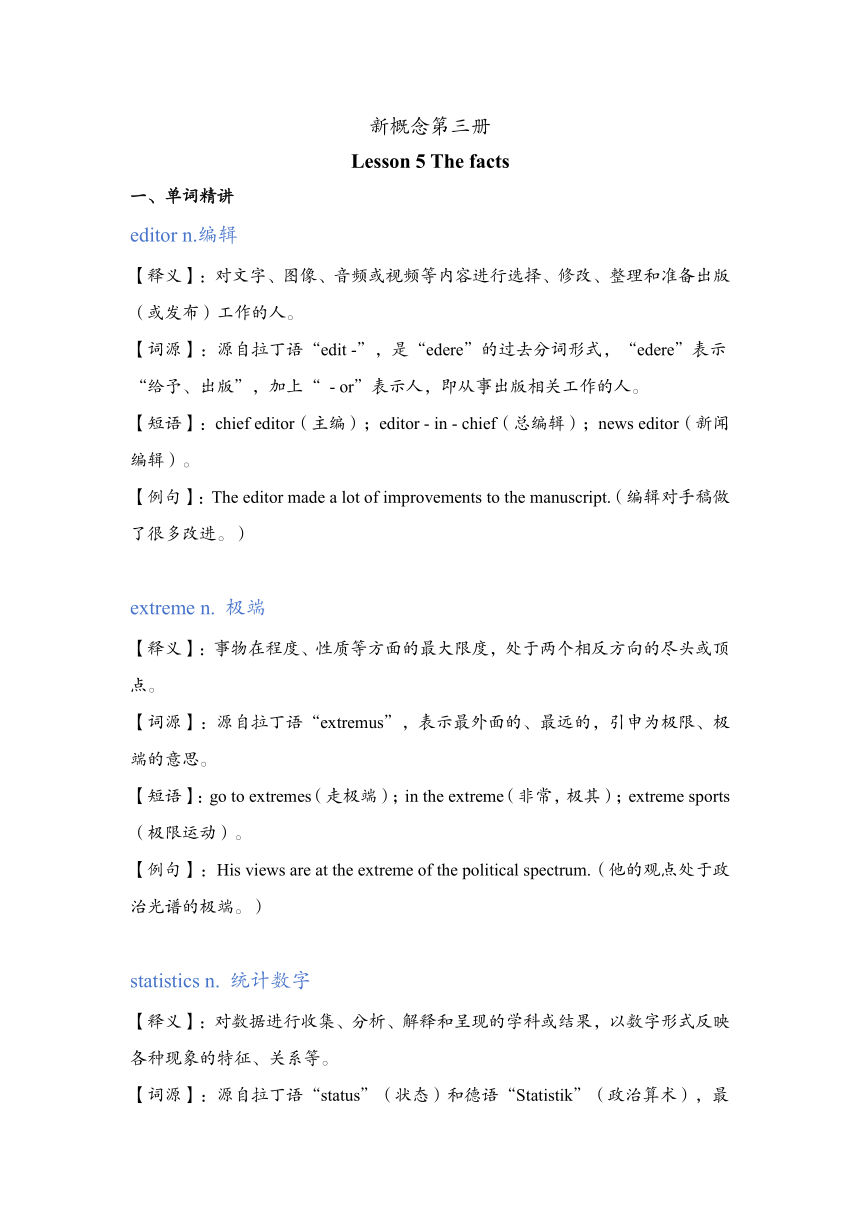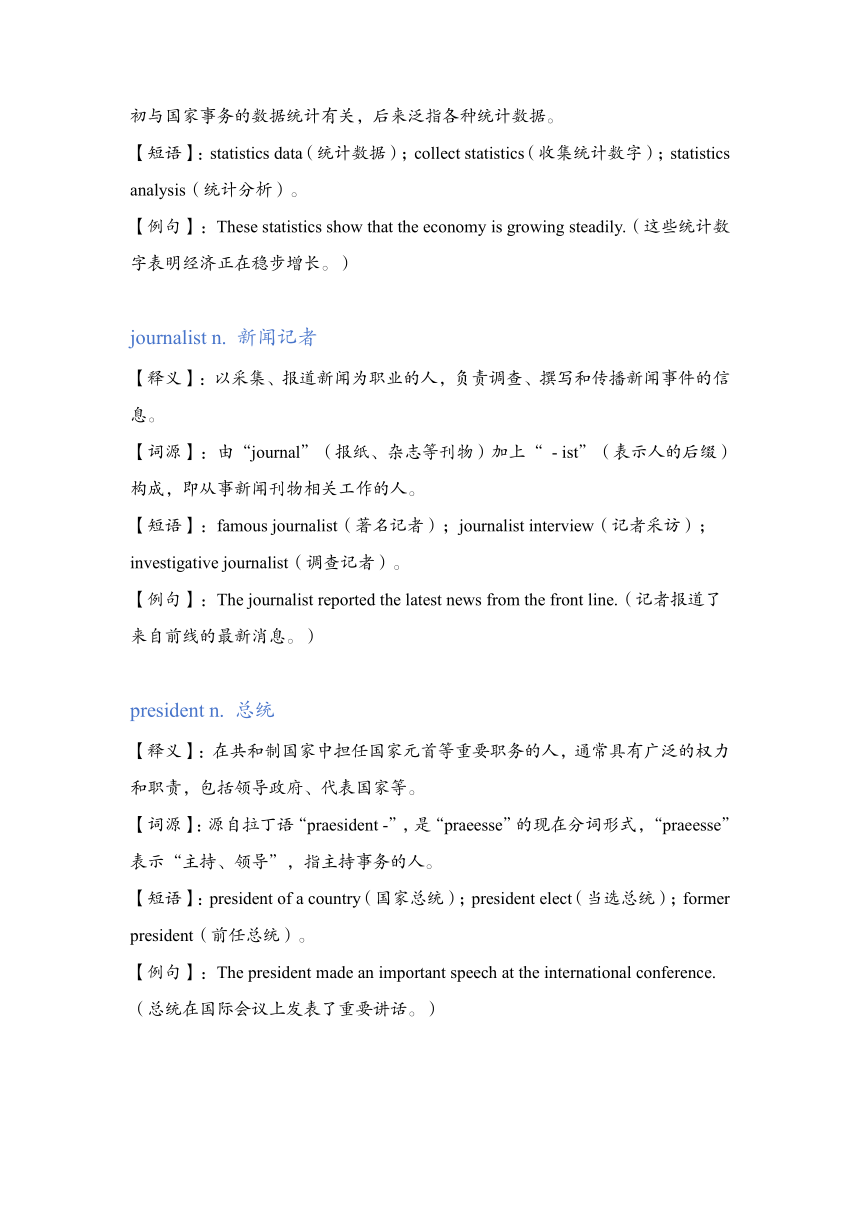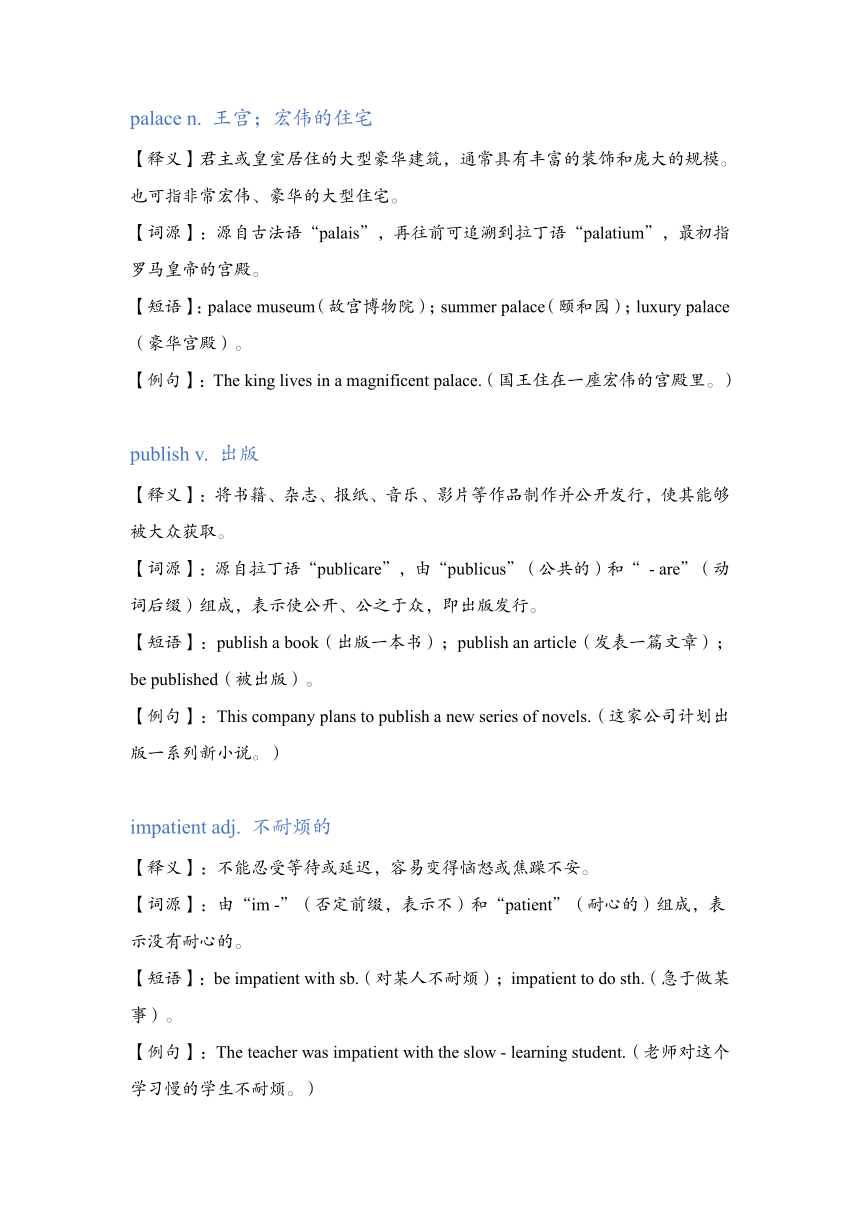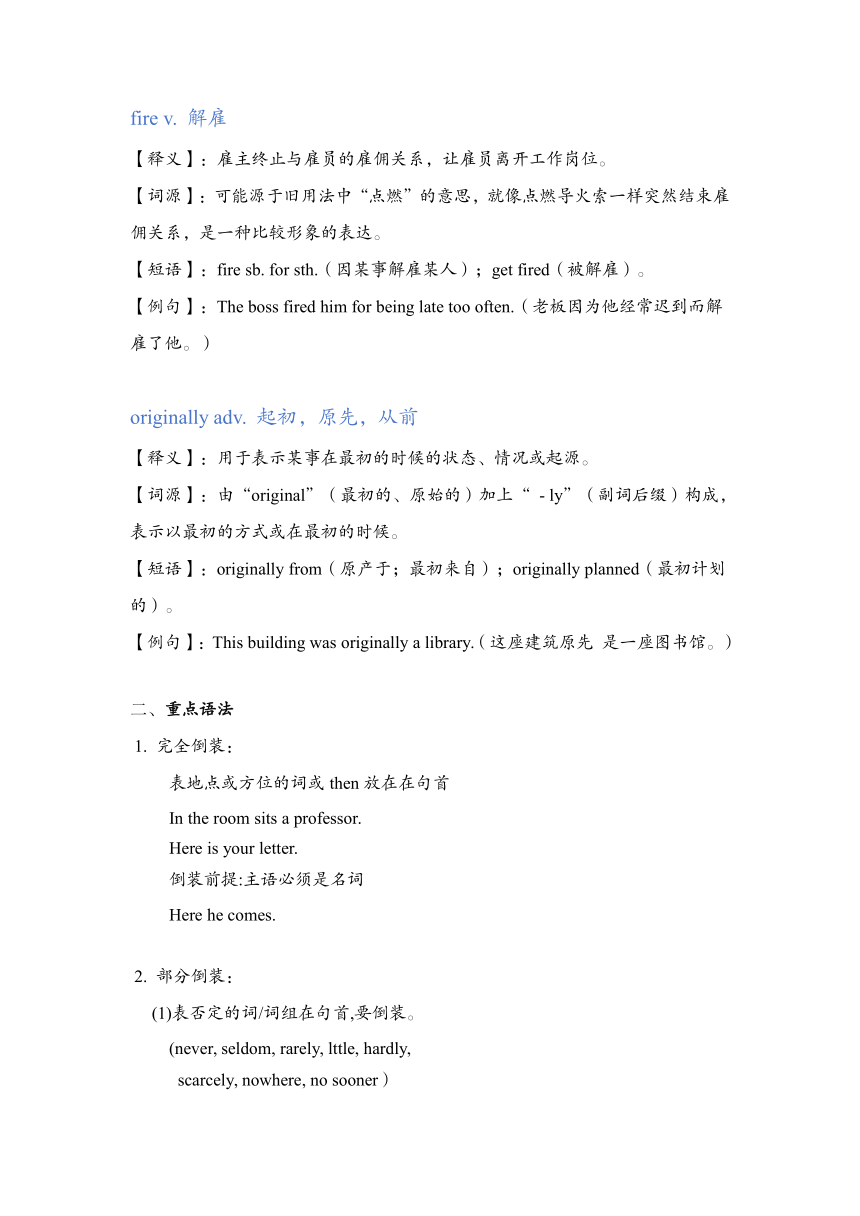新概念第三册Lesson 5 The facts讲义
文档属性
| 名称 | 新概念第三册Lesson 5 The facts讲义 |  | |
| 格式 | docx | ||
| 文件大小 | 145.2KB | ||
| 资源类型 | 教案 | ||
| 版本资源 | 新概念英语 | ||
| 科目 | 英语 | ||
| 更新时间 | 2024-12-04 14:05:48 | ||
图片预览




文档简介
新概念第三册
Lesson 5 The facts
单词精讲
editor n.编辑
【释义】:对文字、图像、音频或视频等内容进行选择、修改、整理和准备出版(或发布)工作的人。
【词源】:源自拉丁语“edit -”,是“edere”的过去分词形式,“edere”表示“给予、出版”,加上“ - or”表示人,即从事出版相关工作的人。
【短语】:chief editor(主编);editor - in - chief(总编辑);news editor(新闻编辑)。
【例句】:The editor made a lot of improvements to the manuscript.(编辑对手稿做了很多改进。)
extreme n. 极端
【释义】:事物在程度、性质等方面的最大限度,处于两个相反方向的尽头或顶点。
【词源】:源自拉丁语“extremus”,表示最外面的、最远的,引申为极限、极端的意思。
【短语】:go to extremes(走极端);in the extreme(非常,极其);extreme sports(极限运动)。
【例句】:His views are at the extreme of the political spectrum.(他的观点处于政治光谱的极端。)
statistics n. 统计数字
【释义】:对数据进行收集、分析、解释和呈现的学科或结果,以数字形式反映各种现象的特征、关系等。
【词源】:源自拉丁语“status”(状态)和德语“Statistik”(政治算术),最初与国家事务的数据统计有关,后来泛指各种统计数据。
【短语】:statistics data(统计数据);collect statistics(收集统计数字);statistics analysis(统计分析)。
【例句】:These statistics show that the economy is growing steadily.(这些统计数字表明经济正在稳步增长。)
journalist n. 新闻记者
【释义】:以采集、报道新闻为职业的人,负责调查、撰写和传播新闻事件的信息。
【词源】:由“journal”(报纸、杂志等刊物)加上“ - ist”(表示人的后缀)构成,即从事新闻刊物相关工作的人。
【短语】:famous journalist(著名记者);journalist interview(记者采访);investigative journalist(调查记者)。
【例句】:The journalist reported the latest news from the front line.(记者报道了来自前线的最新消息。)
president n. 总统
【释义】:在共和制国家中担任国家元首等重要职务的人,通常具有广泛的权力和职责,包括领导政府、代表国家等。
【词源】:源自拉丁语“praesident -”,是“praeesse”的现在分词形式,“praeesse”表示“主持、领导”,指主持事务的人。
【短语】:president of a country(国家总统);president elect(当选总统);former president(前任总统)。
【例句】:The president made an important speech at the international conference.(总统在国际会议上发表了重要讲话。)
palace n. 王宫;宏伟的住宅
【释义】君主或皇室居住的大型豪华建筑,通常具有丰富的装饰和庞大的规模。
也可指非常宏伟、豪华的大型住宅。
【词源】:源自古法语“palais”,再往前可追溯到拉丁语“palatium”,最初指罗马皇帝的宫殿。
【短语】:palace museum(故宫博物院);summer palace(颐和园);luxury palace(豪华宫殿)。
【例句】:The king lives in a magnificent palace.(国王住在一座宏伟的宫殿里。)
publish v. 出版
【释义】:将书籍、杂志、报纸、音乐、影片等作品制作并公开发行,使其能够被大众获取。
【词源】:源自拉丁语“publicare”,由“publicus”(公共的)和“ - are”(动词后缀)组成,表示使公开、公之于众,即出版发行。
【短语】:publish a book(出版一本书);publish an article(发表一篇文章);be published(被出版)。
【例句】:This company plans to publish a new series of novels.(这家公司计划出版一系列新小说。)
impatient adj. 不耐烦的
【释义】:不能忍受等待或延迟,容易变得恼怒或焦躁不安。
【词源】:由“im -”(否定前缀,表示不)和“patient”(耐心的)组成,表示没有耐心的。
【短语】:be impatient with sb.(对某人不耐烦);impatient to do sth.(急于做某事)。
【例句】:The teacher was impatient with the slow - learning student.(老师对这个学习慢的学生不耐烦。)
fire v. 解雇
【释义】:雇主终止与雇员的雇佣关系,让雇员离开工作岗位。
【词源】:可能源于旧用法中“点燃”的意思,就像点燃导火索一样突然结束雇佣关系,是一种比较形象的表达。
【短语】:fire sb. for sth.(因某事解雇某人);get fired(被解雇)。
【例句】:The boss fired him for being late too often.(老板因为他经常迟到而解雇了他。)
originally adv. 起初,原先,从前
【释义】:用于表示某事在最初的时候的状态、情况或起源。
【词源】:由“original”(最初的、原始的)加上“ - ly”(副词后缀)构成,表示以最初的方式或在最初的时候。
【短语】:originally from(原产于;最初来自);originally planned(最初计划的)。
【例句】:This building was originally a library.(这座建筑原先 是一座图书馆。)
重点语法
1. 完全倒装:
表地点或方位的词或then放在在句首
In the room sits a professor.
Here is your letter.
倒装前提:主语必须是名词
Here he comes.
2. 部分倒装:
(1)表否定的词/词组在句首,要倒装。
(never, seldom, rarely, lttle, hardly,
scarcely, nowhere, no sooner)
. scarcely adv.几乎不,简直没有
nowhere adv.无处,到处都无
Never have| read such stories.
我从来也没读过这样的小说。
Nowhere can he find the book he wants.
无论在哪他也找不到他要的书。
Hardly did | think it possible.
我并不认为这是可能的。
(2)含有only/not only的状语在句首,句子要倒装。
Only then did he realize that he had made a mistake.
Only when a great deal more information has
been obtained will it be possible to plan a trip.
(3)含有not的副词短语位于句首,句子要倒装。
not for a second 决不,毫不
not in the least 绝不,一点也不
not for an instant, not until
Not in the least is he interested in English
literature.
他对英国文学一点都不感兴趣。
Not for an instant did | believe he had lied.
我根本不认为他说了慌。
(4)含有no的短语位于句首,句子要倒装。
at on time,in no way,in nos ense,by no means, in no case, on no account, on no
condition, under no circumstances (都表示‘决不’)
circumstance n.环境,详情,境况
Under no circumstances can we accept the check.
我们无论如何也不能接受这笔钱。
On no account must you leave the baby in the
house.
你无论如何也不能把留在房间里。
(5)so/such位于句首,句子要倒装。
So did I.
三、课文精讲
1. Editors of newspapers and magazines often go to extremes to provide their readers with unimportant facts and statistics.报刊杂志的编辑常常为了向读者提供成立一些关紧要的事实和统计数字而走向极端。
(1)go to extremes走极端
(2)provide=supply作“向……提供……”解(通常与介词搭配连用)
provide sb with sth= provide sth for sb
The Chinese parents often go to extremes toprovide their children with outstanding environment and excellent education opportunities. 中国的父母们常常不遗余力/不顾一切地为自己的孩子提供优越的环境和良好的教育机会。
2. Last year a journalist had been instructed by a well-known magazine to write an article on the president's palace in a new African republic.去年,一位记者受一家有名的杂志的委托写一篇关于非洲某个新成立共和国总统府的文章。
(1)instruct sb to do sth= tell sb formally to do sth
正式告诉某人做某事.
(2)to write an article on, 写一篇有关的报道。
about所跟名词范围广;on学术性作品前用
A research on the African world .
on=about侧重强调课题专一
a book on radio
(3)African n.非洲人adj.非洲的
Republic n.共和国,共和政体.
3.When the article arrived, the editor read the first sentence and then refused to publish it.稿子寄来后,编辑看第一句话就拒绝予以发表。
refuse vt.拒绝( 态度严厉)
refuse to do= do not want to do
decline vt.婉言谢绝
repudiate vt. 断然拒绝
Fail to do= do not do
Deny doing= do not admit doing
4. The editor at once sent the journalist a fax instructing him to find out the exact number of steps and the height of the wall.编辑立即给那位记者发去传真,要求他核实一下台阶的确切数字和围墙的高度。
instructing(现在分词)进一步补充说明fax的情况
He send me a letter instructing me to come
back immediately.
5. The journalist immediately set out to obtain these important facts,记者立即出发去核实这些重要的事实,
(1) set out to do = decide and try to do
=set about doing
决定,打算,着手做...
set out to do= try to do
(2) take sb a long time to do sth
某事花了某人很久的时间
It took me five days to write the article.
6. but he took a long time to send them. Meanwhile, the editor was getting impatient, for the magazine would soon go to press.但过了好长时间不见他把数字寄来,在此期间,编辑等得不耐烦了,因为杂志马上要付印。
getting有逐步,渐进的意思
It’s getting dark.天渐渐黑了下来。
two more faxes = another two faxes
7. He sent the journalist two more faxes, but received no reply.他给记者先后发去两份传真,但对方毫无反应。
two more faxes = another two faxes
8. When the journalist again failed to reply, the editor reluctantly published the article as it had originally been written.但记者还是没有回复。编辑无奈,勉强按原样发稿了。
reluctantly = unwilling勉勉强强地,不情愿地
as it bad originally been written
= in its original way
9. Not only had the poor man been arrested, but he had been sent to prison as well.那个可怜的记者不仅被捕了,而且还被送进了监狱。
Not only位于句首,必须采用倒装形式。
= The poor man had not only been arrested,but had been sent to prison as well.
Lesson 5 The facts
单词精讲
editor n.编辑
【释义】:对文字、图像、音频或视频等内容进行选择、修改、整理和准备出版(或发布)工作的人。
【词源】:源自拉丁语“edit -”,是“edere”的过去分词形式,“edere”表示“给予、出版”,加上“ - or”表示人,即从事出版相关工作的人。
【短语】:chief editor(主编);editor - in - chief(总编辑);news editor(新闻编辑)。
【例句】:The editor made a lot of improvements to the manuscript.(编辑对手稿做了很多改进。)
extreme n. 极端
【释义】:事物在程度、性质等方面的最大限度,处于两个相反方向的尽头或顶点。
【词源】:源自拉丁语“extremus”,表示最外面的、最远的,引申为极限、极端的意思。
【短语】:go to extremes(走极端);in the extreme(非常,极其);extreme sports(极限运动)。
【例句】:His views are at the extreme of the political spectrum.(他的观点处于政治光谱的极端。)
statistics n. 统计数字
【释义】:对数据进行收集、分析、解释和呈现的学科或结果,以数字形式反映各种现象的特征、关系等。
【词源】:源自拉丁语“status”(状态)和德语“Statistik”(政治算术),最初与国家事务的数据统计有关,后来泛指各种统计数据。
【短语】:statistics data(统计数据);collect statistics(收集统计数字);statistics analysis(统计分析)。
【例句】:These statistics show that the economy is growing steadily.(这些统计数字表明经济正在稳步增长。)
journalist n. 新闻记者
【释义】:以采集、报道新闻为职业的人,负责调查、撰写和传播新闻事件的信息。
【词源】:由“journal”(报纸、杂志等刊物)加上“ - ist”(表示人的后缀)构成,即从事新闻刊物相关工作的人。
【短语】:famous journalist(著名记者);journalist interview(记者采访);investigative journalist(调查记者)。
【例句】:The journalist reported the latest news from the front line.(记者报道了来自前线的最新消息。)
president n. 总统
【释义】:在共和制国家中担任国家元首等重要职务的人,通常具有广泛的权力和职责,包括领导政府、代表国家等。
【词源】:源自拉丁语“praesident -”,是“praeesse”的现在分词形式,“praeesse”表示“主持、领导”,指主持事务的人。
【短语】:president of a country(国家总统);president elect(当选总统);former president(前任总统)。
【例句】:The president made an important speech at the international conference.(总统在国际会议上发表了重要讲话。)
palace n. 王宫;宏伟的住宅
【释义】君主或皇室居住的大型豪华建筑,通常具有丰富的装饰和庞大的规模。
也可指非常宏伟、豪华的大型住宅。
【词源】:源自古法语“palais”,再往前可追溯到拉丁语“palatium”,最初指罗马皇帝的宫殿。
【短语】:palace museum(故宫博物院);summer palace(颐和园);luxury palace(豪华宫殿)。
【例句】:The king lives in a magnificent palace.(国王住在一座宏伟的宫殿里。)
publish v. 出版
【释义】:将书籍、杂志、报纸、音乐、影片等作品制作并公开发行,使其能够被大众获取。
【词源】:源自拉丁语“publicare”,由“publicus”(公共的)和“ - are”(动词后缀)组成,表示使公开、公之于众,即出版发行。
【短语】:publish a book(出版一本书);publish an article(发表一篇文章);be published(被出版)。
【例句】:This company plans to publish a new series of novels.(这家公司计划出版一系列新小说。)
impatient adj. 不耐烦的
【释义】:不能忍受等待或延迟,容易变得恼怒或焦躁不安。
【词源】:由“im -”(否定前缀,表示不)和“patient”(耐心的)组成,表示没有耐心的。
【短语】:be impatient with sb.(对某人不耐烦);impatient to do sth.(急于做某事)。
【例句】:The teacher was impatient with the slow - learning student.(老师对这个学习慢的学生不耐烦。)
fire v. 解雇
【释义】:雇主终止与雇员的雇佣关系,让雇员离开工作岗位。
【词源】:可能源于旧用法中“点燃”的意思,就像点燃导火索一样突然结束雇佣关系,是一种比较形象的表达。
【短语】:fire sb. for sth.(因某事解雇某人);get fired(被解雇)。
【例句】:The boss fired him for being late too often.(老板因为他经常迟到而解雇了他。)
originally adv. 起初,原先,从前
【释义】:用于表示某事在最初的时候的状态、情况或起源。
【词源】:由“original”(最初的、原始的)加上“ - ly”(副词后缀)构成,表示以最初的方式或在最初的时候。
【短语】:originally from(原产于;最初来自);originally planned(最初计划的)。
【例句】:This building was originally a library.(这座建筑原先 是一座图书馆。)
重点语法
1. 完全倒装:
表地点或方位的词或then放在在句首
In the room sits a professor.
Here is your letter.
倒装前提:主语必须是名词
Here he comes.
2. 部分倒装:
(1)表否定的词/词组在句首,要倒装。
(never, seldom, rarely, lttle, hardly,
scarcely, nowhere, no sooner)
. scarcely adv.几乎不,简直没有
nowhere adv.无处,到处都无
Never have| read such stories.
我从来也没读过这样的小说。
Nowhere can he find the book he wants.
无论在哪他也找不到他要的书。
Hardly did | think it possible.
我并不认为这是可能的。
(2)含有only/not only的状语在句首,句子要倒装。
Only then did he realize that he had made a mistake.
Only when a great deal more information has
been obtained will it be possible to plan a trip.
(3)含有not的副词短语位于句首,句子要倒装。
not for a second 决不,毫不
not in the least 绝不,一点也不
not for an instant, not until
Not in the least is he interested in English
literature.
他对英国文学一点都不感兴趣。
Not for an instant did | believe he had lied.
我根本不认为他说了慌。
(4)含有no的短语位于句首,句子要倒装。
at on time,in no way,in nos ense,by no means, in no case, on no account, on no
condition, under no circumstances (都表示‘决不’)
circumstance n.环境,详情,境况
Under no circumstances can we accept the check.
我们无论如何也不能接受这笔钱。
On no account must you leave the baby in the
house.
你无论如何也不能把留在房间里。
(5)so/such位于句首,句子要倒装。
So did I.
三、课文精讲
1. Editors of newspapers and magazines often go to extremes to provide their readers with unimportant facts and statistics.报刊杂志的编辑常常为了向读者提供成立一些关紧要的事实和统计数字而走向极端。
(1)go to extremes走极端
(2)provide=supply作“向……提供……”解(通常与介词搭配连用)
provide sb with sth= provide sth for sb
The Chinese parents often go to extremes toprovide their children with outstanding environment and excellent education opportunities. 中国的父母们常常不遗余力/不顾一切地为自己的孩子提供优越的环境和良好的教育机会。
2. Last year a journalist had been instructed by a well-known magazine to write an article on the president's palace in a new African republic.去年,一位记者受一家有名的杂志的委托写一篇关于非洲某个新成立共和国总统府的文章。
(1)instruct sb to do sth= tell sb formally to do sth
正式告诉某人做某事.
(2)to write an article on, 写一篇有关的报道。
about所跟名词范围广;on学术性作品前用
A research on the African world .
on=about侧重强调课题专一
a book on radio
(3)African n.非洲人adj.非洲的
Republic n.共和国,共和政体.
3.When the article arrived, the editor read the first sentence and then refused to publish it.稿子寄来后,编辑看第一句话就拒绝予以发表。
refuse vt.拒绝( 态度严厉)
refuse to do= do not want to do
decline vt.婉言谢绝
repudiate vt. 断然拒绝
Fail to do= do not do
Deny doing= do not admit doing
4. The editor at once sent the journalist a fax instructing him to find out the exact number of steps and the height of the wall.编辑立即给那位记者发去传真,要求他核实一下台阶的确切数字和围墙的高度。
instructing(现在分词)进一步补充说明fax的情况
He send me a letter instructing me to come
back immediately.
5. The journalist immediately set out to obtain these important facts,记者立即出发去核实这些重要的事实,
(1) set out to do = decide and try to do
=set about doing
决定,打算,着手做...
set out to do= try to do
(2) take sb a long time to do sth
某事花了某人很久的时间
It took me five days to write the article.
6. but he took a long time to send them. Meanwhile, the editor was getting impatient, for the magazine would soon go to press.但过了好长时间不见他把数字寄来,在此期间,编辑等得不耐烦了,因为杂志马上要付印。
getting有逐步,渐进的意思
It’s getting dark.天渐渐黑了下来。
two more faxes = another two faxes
7. He sent the journalist two more faxes, but received no reply.他给记者先后发去两份传真,但对方毫无反应。
two more faxes = another two faxes
8. When the journalist again failed to reply, the editor reluctantly published the article as it had originally been written.但记者还是没有回复。编辑无奈,勉强按原样发稿了。
reluctantly = unwilling勉勉强强地,不情愿地
as it bad originally been written
= in its original way
9. Not only had the poor man been arrested, but he had been sent to prison as well.那个可怜的记者不仅被捕了,而且还被送进了监狱。
Not only位于句首,必须采用倒装形式。
= The poor man had not only been arrested,but had been sent to prison as well.
同课章节目录
